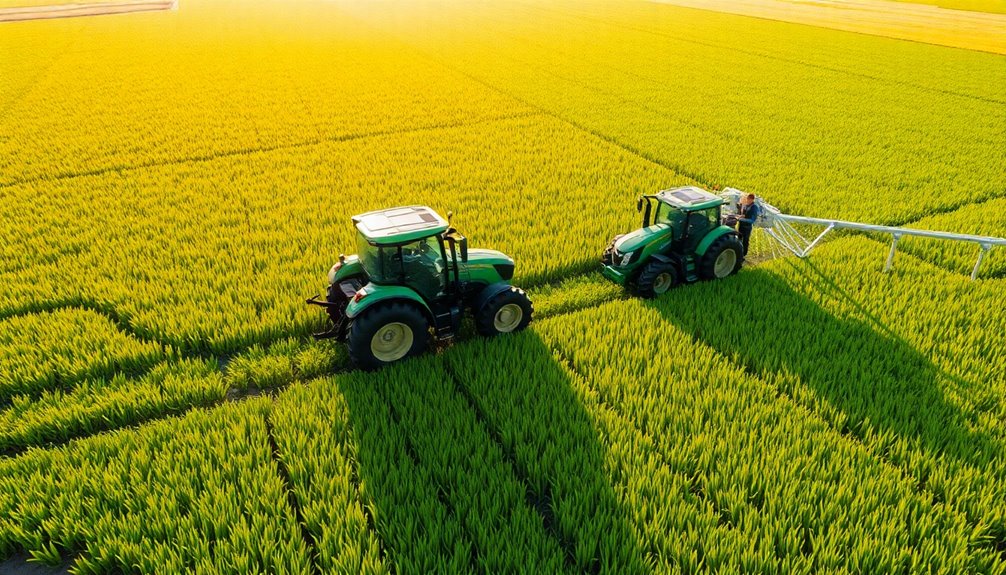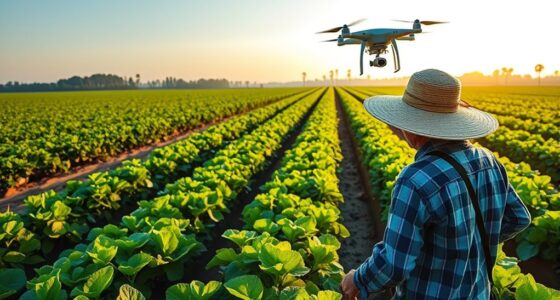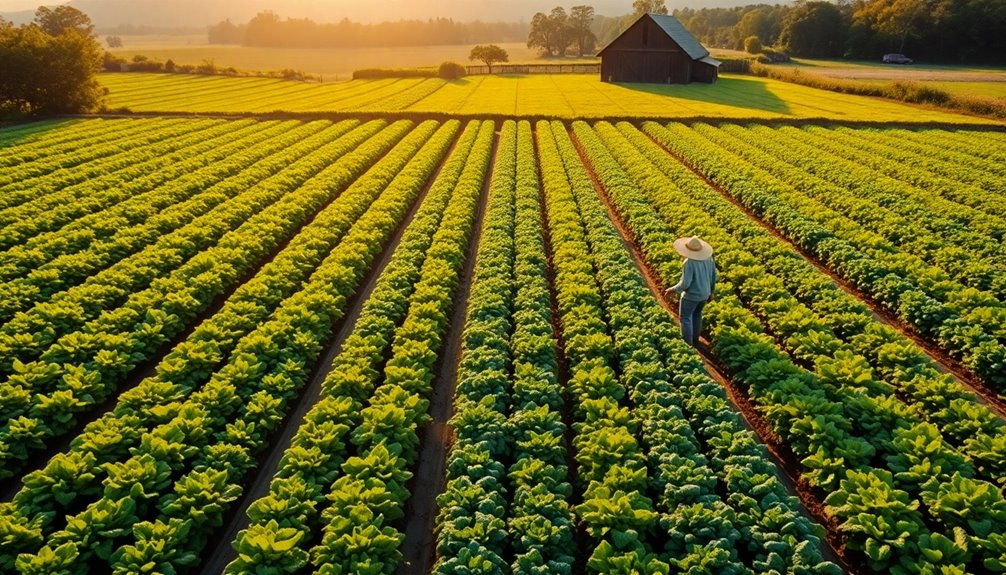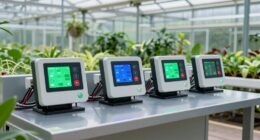Innovative farming techniques are transforming agriculture and boosting productivity. You'll find that mechanization, like tractors and grain drills, enhances efficiency and yields. Precision agriculture uses data analytics and drones for targeted interventions, ensuring better crop health. Sustainable methods, such as crop rotation and organic farming, improve soil fertility and reduce reliance on chemicals. Advanced irrigation systems optimize water use, promoting sustainability. With continuous development in agricultural legislation supporting research, innovations are more accessible than ever. Keep exploring to uncover how these advancements can elevate your farming practices and enhance productivity even further.
Key Takeaways
- Mechanization, including tractors and combines, significantly increases efficiency and crop yields in modern farming practices.
- The introduction of grain drills enhances seed planting precision, leading to improved germination rates and uniform crop growth.
- Advanced pest control methods and inorganic fertilizers boost nutrient availability, reducing crop damage and enhancing yields.
- Precision agriculture utilizes data analytics and drones for targeted interventions, optimizing resource use and improving crop health.
- Sustainable practices like crop rotation and organic farming enhance soil health, leading to increased productivity and reduced reliance on chemicals.
Innovations in Farm Machinery
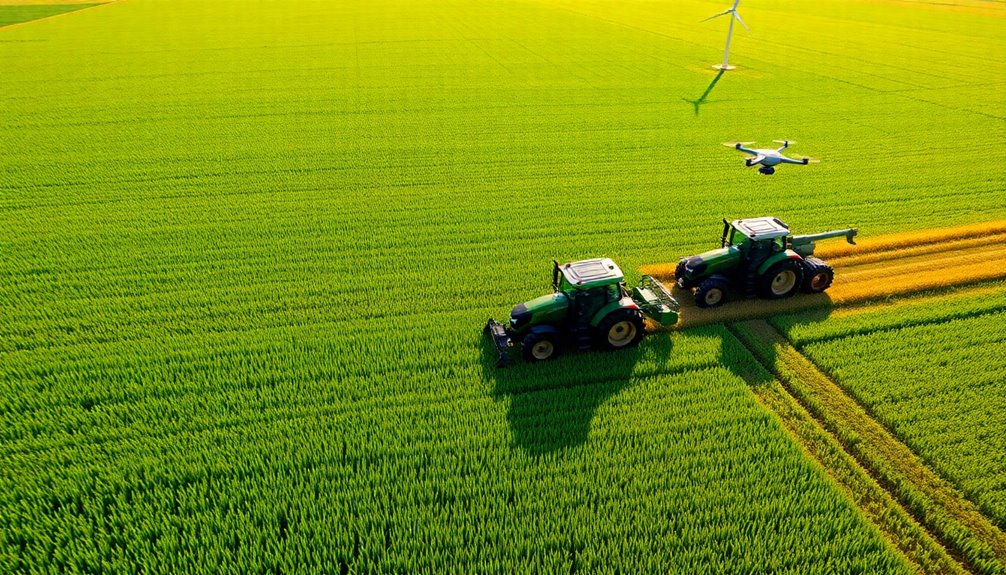
Innovations in farm machinery have transformed agriculture, making it more efficient and productive than ever.
The steam-powered reaper revolutionized grain harvesting, allowing you to harvest up to 100 acres daily, drastically cutting labor costs.
John Deere's steel plow improved soil cultivation in tough conditions, enabling you to till land more effectively.
The grain drill enhanced your seed planting precision, leading to uniform crop growth and higher yields.
With the advent of tractors in the 1920s, mechanized farming tasks became a breeze, allowing you to cultivate larger areas with less manpower.
Twine binders automated hay harvesting, speeding up and standardizing the bundling process.
These advancements in agricultural efficiency have truly reshaped the farming landscape, enhancing productivity across the board.
Advanced Farming Techniques
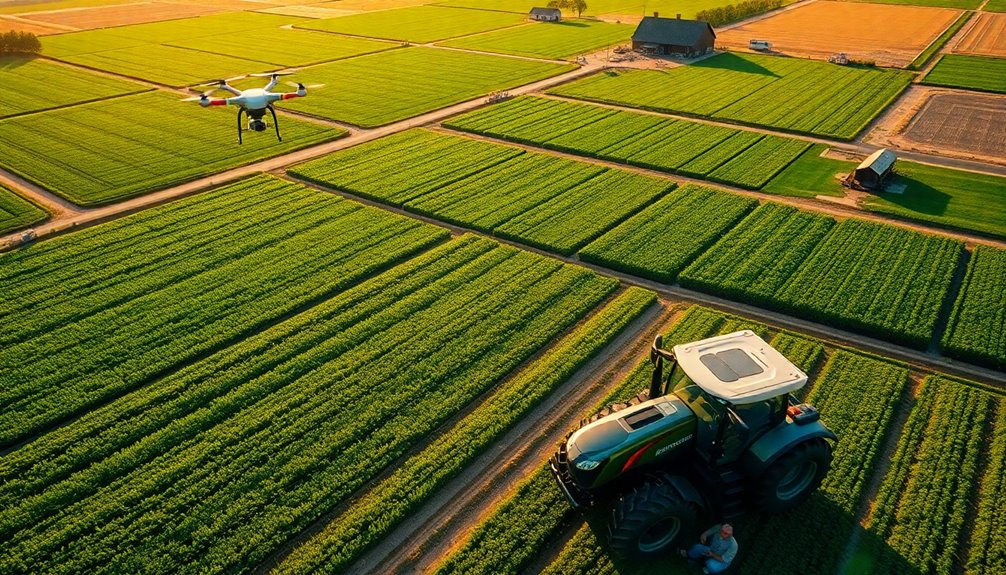
To boost your farm's productivity, consider implementing advanced farming techniques like crop rotation, pest management innovations, and irrigation system advancements.
These strategies not only improve soil health and reduce pest issues but also guarantee your crops receive the moisture they need.
Crop Rotation Strategies
Crop rotation strategies are vital for enhancing agricultural productivity and maintaining soil health. By alternating the types of crops you grow each season, you can considerably boost soil fertility and prevent pest buildup.
For instance, rotating legumes with cereals naturally replenishes nitrogen levels in the soil, promoting overall ecosystem health. Implementing crop rotation can lead to a yield increase of 10% to 25% compared to continuous cropping systems, making it an essential practice for sustainable agriculture.
Furthermore, this technique disrupts the life cycles of pests and diseases, reducing the reliance on chemical pest control methods. Historically, ancient civilizations like the Romans and the Mayans thrived by utilizing these strategies, showcasing their importance in achieving long-term productivity and sustainability in farming.
Pest Management Innovations
As farmers face the challenge of increasing pest resistance and environmental concerns, adopting advanced pest management techniques becomes essential for sustainable agriculture.
Integrated Pest Management (IPM) blends biological, cultural, physical, and chemical strategies to minimize environmental impact while managing pests effectively. By utilizing pest-resistant crop varieties developed through selective breeding, you can considerably reduce chemical pesticide reliance, boosting crop yields and profitability.
Innovations like pheromone traps and the release of beneficial insects help control pests naturally, cutting down pesticide use by up to 50%.
Precision agriculture technologies, such as drones for real-time monitoring, allow you to target interventions precisely, enhancing crop health.
Additionally, biopesticides derived from natural materials offer a safer alternative to synthetic chemicals, supporting a sustainable food supply.
Irrigation System Advancements
Innovative irrigation system advancements are transforming modern agriculture, making it easier for you to optimize water usage and enhance crop yields.
With techniques like drip and sprinkler systems, you can achieve impressive water efficiency, cutting water usage by up to 50% compared to traditional methods.
Automated systems that utilize sensors and weather data allow for precise irrigation tailored to your crops' needs, improving yield quality and minimizing waste.
Additionally, practices like rainwater harvesting and aquaponics not only address water scarcity but also promote sustainable farming methods.
By adopting these advancements, you're not just boosting productivity; you're also contributing to a more sustainable agricultural future.
Embrace these innovations to elevate your farming practices and secure better results.
Role of Agricultural Legislation
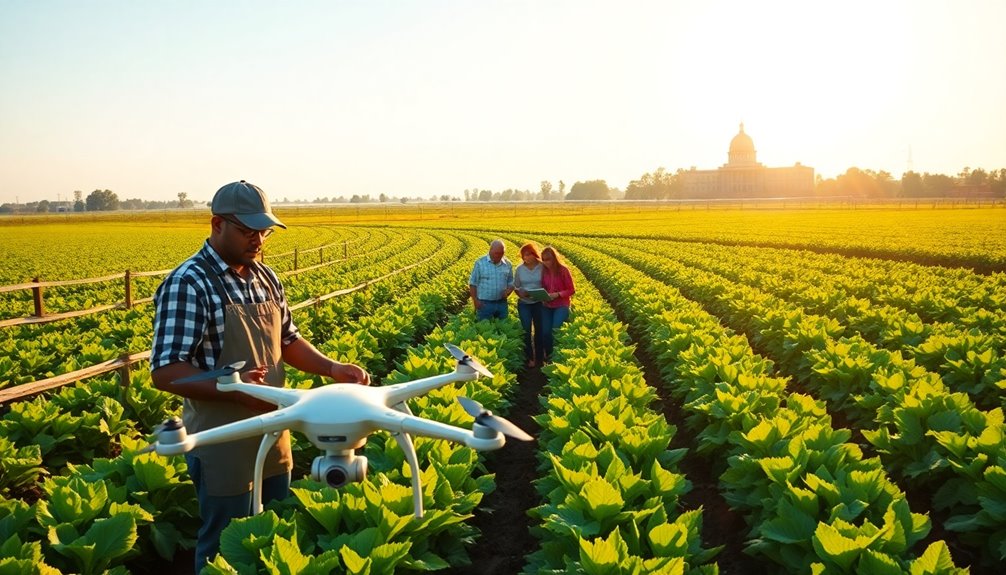
How does agricultural legislation shape the landscape of modern farming? It lays the groundwork for progress by funding agricultural research, like the Hatch Act of 1887, which boosted farming practices and productivity.
The Smith-Lever Act of 1914 further enhanced this by establishing extension services that share innovative techniques directly with farmers. With the creation of the Secretary of Agriculture position in 1889, there's now dedicated oversight to support agricultural policies and education.
This commitment led to improved farming practices that raise crop yields and strengthen food security. By investing in research and education, agricultural legislation empowers you to adopt new methods, ensuring your farming efforts contribute to a more productive and sustainable future.
Challenges Faced by Farmers
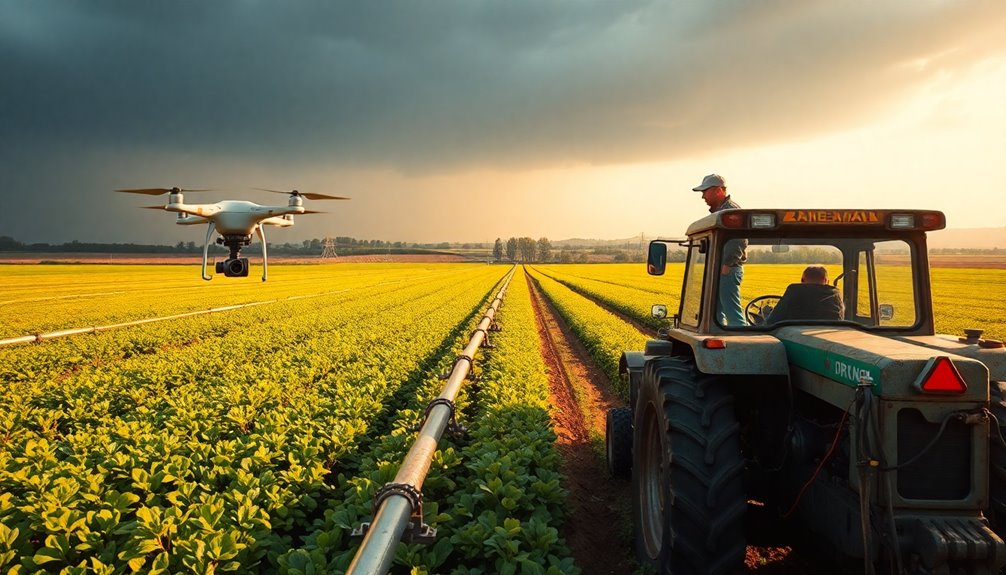
As a farmer, you're likely grappling with water scarcity, which makes effective crop cultivation a constant challenge.
Coupled with this, many inexperienced farmers struggle to adapt, facing steep learning curves that can hinder productivity.
Understanding these obstacles is essential for developing effective farming strategies.
Water Scarcity Issues
Water scarcity is a pressing issue that challenges farmers around the globe, especially in regions where rainfall is scarce.
To combat this, you can adopt innovative practices that guarantee sustainable agriculture and improve productivity. Here are three effective strategies:
- Advanced Irrigation Systems: Implementing drip irrigation or center pivot systems can considerably reduce water usage by up to 50% while maintaining crop yields.
- Drought-Resistant Varieties: Selecting crops that thrive in low-water conditions helps mitigate the impacts of water scarcity.
- Education Programs: Participating in training focused on moisture conservation and efficient agricultural practices equips you to adapt to changing climate conditions.
Inexperienced Farmers' Struggles
Many inexperienced farmers face intimidating challenges that can hinder their success in agriculture. The influx of new settlers, especially after the Homestead Act, made it tough to manage the harsh environmental conditions of the Great Plains.
Without knowledge of essential farming techniques like dry farming, many struggle with crop failure due to limited water supply. The increased demand for food from rising immigration puts additional pressure on you, straining resources and leading to economic instability.
Harsh weather, soil degradation, and a lack of training and education in modern agricultural practices complicate your efforts to adapt. To enhance productivity, it's vital to seek guidance and learn innovative techniques that can help you overcome these obstacles and thrive in farming.
Importance of Agricultural Education
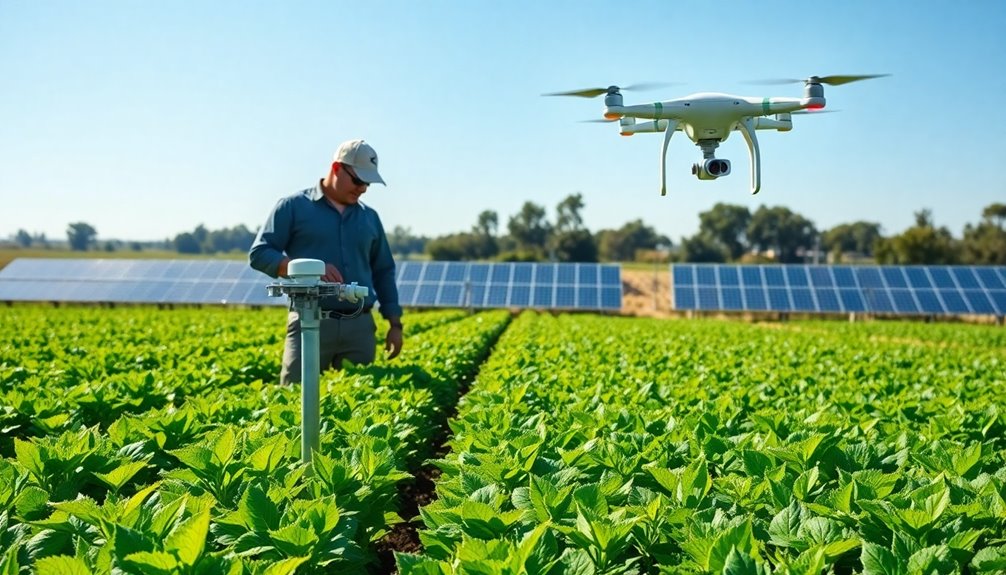
Agricultural education plays an essential role in transforming farming practices and boosting productivity. By prioritizing training programs, you can enhance your skills and adapt to modern techniques that promote sustainability.
Here are three key benefits of agricultural education:
- Hands-on Learning: Workshops and demonstrations help you apply new farming techniques directly on your farm.
- Access to Resources: Agricultural extension services provide crucial information, improving your resource management and crop yields.
- Continuous Improvement: Education initiatives disseminate research findings, allowing you to stay informed about evolving challenges and technologies.
Investing in agricultural education not only empowers you to improve productivity but also equips you to tackle the future of farming with confidence and innovation.
Technological Advances Impacting Farming
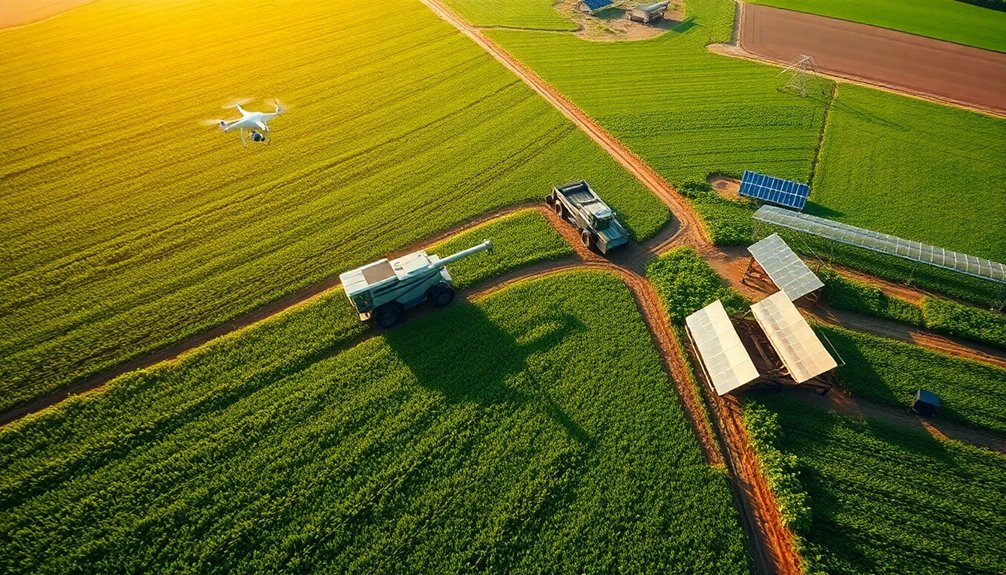
Innovation is reshaping the landscape of farming, driving remarkable advancements in productivity. Mechanization, through tractors and combines, has dramatically increased efficiency, enabling you to cultivate larger areas with less manpower, boosting crop yields.
The steam-powered reaper and steel plow revolutionized harvesting and soil cultivation, while grain drills improved seed planting precision, ensuring better germination and uniformity.
Advanced pest control methods and inorganic fertilizers have reduced crop damage and enhanced nutrient availability, greatly contributing to agricultural productivity.
Furthermore, precision agriculture techniques, utilizing data analytics and self-steering tractors, optimize resource use and enhance decision-making.
Additionally, the adoption of organic farming methods has proven to enhance soil health and sustainability, further contributing to increased productivity in modern agriculture.
These technological advances are essential for modern farming, empowering you to achieve higher efficiency and sustainability in your agricultural practices.
Economic Factors in Agriculture
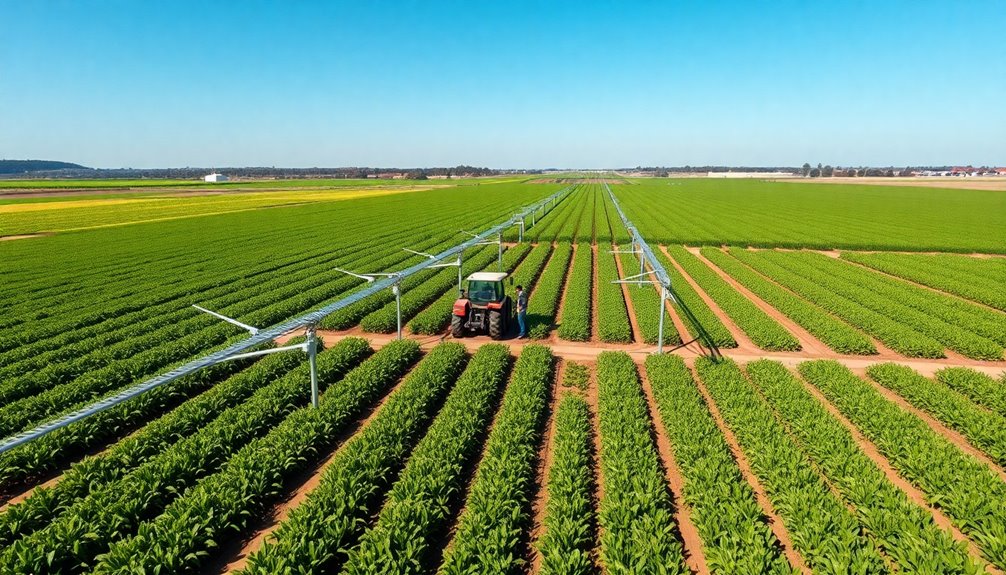
In today's farming landscape, economic factors play a pivotal role in shaping your decisions and practices. Understanding these elements can greatly enhance your productivity and profitability.
Here are three key aspects to reflect upon:
- Market Demand: It influences your crop selection and farming practices, pushing you to adapt to consumer preferences.
- Price Fluctuations: These can directly impact your income, affecting your willingness to invest in innovative farming techniques.
- Access to Credit: Securing loans allows you to purchase essential equipment, boosting your operational efficiency.
Future Trends in Agriculture
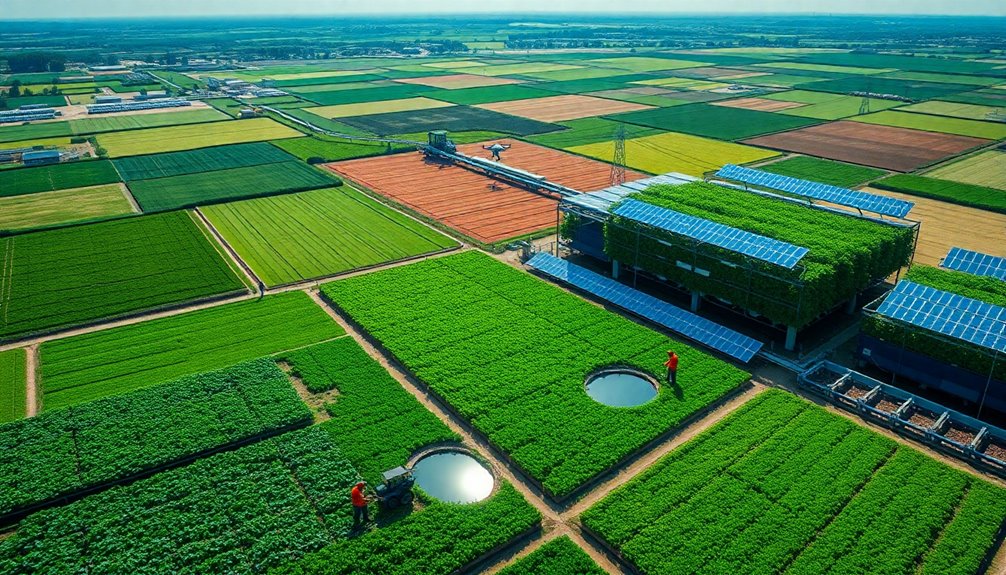
As economic factors shape your farming practices today, they also set the stage for the future of agriculture.
You'll see a surge in climate-resilient crops designed to withstand changing environmental conditions. Precision agriculture and sustainable practices will become the norm, enhancing soil health and reducing your environmental footprint.
Advanced technologies like AI, drones, and IoT devices will facilitate real-time monitoring, allowing you to make data-driven decisions for greater efficiency.
Vertical farming will address urban food production challenges, enabling year-round crop cultivation with minimal resources.
Collaboration among farmers, researchers, and policymakers is essential to drive innovation in agriculture, ensuring food security and sustainability for future generations. Moreover, integrating solar-powered irrigation systems will enhance crop yields and efficiency, contributing to sustainable agricultural practices.
Embracing these trends will position you at the forefront of agricultural advancement.
Frequently Asked Questions
What Are Four Innovations in Farming Techniques That Led to Great Productivity?
You might find that crop rotation, inorganic fertilizers, advanced irrigation systems, and pest control methods are key innovations boosting farming productivity.
By rotating crops, you enhance soil health and reduce pests. Using inorganic fertilizers gives your plants concentrated nutrients for better growth.
Efficient irrigation systems help manage water supply, especially in dry areas. Finally, employing pest control techniques minimizes damage, ensuring healthier yields and less loss from infestations.
These strategies greatly elevate agricultural output.
What Types of Innovations Have Led to a Rise in Agricultural Production?
Innovations in agriculture have transformed farming like sunlight breaking through dark clouds.
You've seen how crop rotation revitalizes soil, while inorganic fertilizers pump nutrients into the ground, boosting yields considerably.
Drought-resistant seeds offer resilience in tough climates, ensuring reliable harvests.
Advanced irrigation systems let you manage water efficiently, even in arid regions.
Finally, integrating pest control methods helps protect crops without harmful chemicals, promoting healthier produce and sustainable farming practices.
What Were Some Innovations in Farm Machinery That Led to Improved Results in Agriculture the Great Plains?
You'd find that several innovations in farm machinery greatly improved agricultural results on the Great Plains.
The steel plow made it easier to break through tough soils, while the steam-powered reaper sped up grain harvesting considerably.
Additionally, the grain drill guaranteed seeds were planted accurately, and tractors allowed you to cultivate larger areas with less labor.
Finally, the twine binder automated hay harvesting, making the entire process far more efficient and productive.
What Technology Made Their Agriculture More Productive?
To make agriculture more productive, you've got to embrace key technologies.
The grain drill allows you to plant seeds more precisely, boosting your yields.
Using steam-powered reapers, you can harvest vast fields quickly, saving time and labor.
Mechanization with tractors lets you cover larger areas efficiently.
Advanced pest control methods reduce crop damage, while improved irrigation systems guarantee consistent water supply, allowing you to farm in previously unsuitable areas.
Conclusion
In the world of agriculture, embracing innovation is key to thriving. As the saying goes, "You reap what you sow." By adopting advanced machinery, techniques, and education, you're not just improving productivity; you're securing a sustainable future for farming. While challenges may arise, staying informed and adaptable will help you navigate them. As you look ahead, remember that the seeds you plant today will shape the bountiful harvest of tomorrow. Keep pushing forward!

